Where do you report illegal or problematic internet content and internet fraud?
Did you fall victim to cybercrime or come across problematic or illegal content on the internet?
Depending on the type of fraud, there are various agencies you can turn to.
-
General government hotline
If you're a victim of deception, fraud or scams, or your rights as a consumer or business were not respected, you can go to the government's general hotline:
https://meldpunt.belgie.be/meldpunt/en/welcome
When you report a problem on this hotline, advice on how to enforce your rights will be provided immediately.
On meldpunt.belgie.be, private persons and companies can report issues related to:
> illegal trade practices and deceit: misleading advertising or price indications, credit problems, unsolicited calls or emails, delivery problems, wrong food labelling, warranty problems, non-compliance with the smoking ban, etc.
> fraud: phishing, spoofing (pretending to be someone else online), fake vouchers by email, fake self-employment/illegal employment/undeclared employment, etc.
> deception: fake invoices, fake lottery, fraudulent fines by email, etc.
-
CERT Hotline
To report incidents related to an organisation's cybersecurity, you can contact the CERT hotline (Cyber Emergency Response Team).
https://www.cert.be/en/een-incident-melden-form
CERT is part of the Centre for Cybersecurity Belgium and its mission is to analyse, mitigate and combat cyber attacks.
If your company or organisation fell victim to ransomware, hacking, a virus infection, DDOS attack, etc., report this as an incident to the CERT. In some cases (see NIS and NIS2 directives), it's even mandatory to report these incidents.
-
Safeonweb
If you're looking for specific help or advice on your online safety rather than reporting a problem, please visit Safeonweb.
Safeonweb is an initiative of the Centre for Cybersecurity Belgium and aims to inform and advise people quickly and correctly about cybersecurity, major current digital threats and online safety.
-
ConsumerConnect Hotline
Are you a consumer and did you fall victim to unfair trade practices? Instead of the general government hotline, you can also contact the FPS Economy's ConsumerConnect hotline.
This hotline is only for consumers to report breaches of consumer law.
For example:
- your consumer rights were violated when buying or selling on the internet.
- you made payments to fraudulent web shops for products you never received.
- spam and fraud of brands, shops or products.
On consumerconnect.be you’ll also find a thematic overview of your rights as a consumer, e.g. about travel, telecom services, energy contracts, insurance, advertising, etc.
Are you a company or organisation? Contact the general government hotline.
-
Child Focus Hotline
Pornographic images with minors or sexual abuse images of minors should be reported immediately to Child Focus.
A specialised team, bound by professional secrecy, analyses the images.
In case of suspected abuse of minors, they forward the images to the federal police or the INHOPE platform if the images are hosted abroad.
-
DNS Belgium
Only the official bodies listed above are authorised to handle cybercrime complaints. Although we’re responsible for the security of the .be zone, we have no authority to take note of complaints about the provision of ICT services.
This includes: hosting, internet access, development of websites (and so on), invoicing of these services, complaints about spam, phishing, hacking, illegal trade practices and fraud or attempted fraud via websites.
To request specific details of a particular domain name or to report complaints about a domain name, please go to our website.
-
Social Fraud Hotline
For reports related to social fraud, private persons and companies can contact the Social Fraud Hotline.
www.meldpuntsocialefraude.belgie.be/en/
They include undeclared work, illegal labour, poor working conditions, work-related discrimination, economic exploitation/human trafficking, unfair competition or social dumping, etc.
-
Safeonweb advises
People are buying increasingly more things on webshops. Second-hand sites such as Vinted, 2ehands, Marktplaats and Facebook Marketplace are also very popular. Unfortunately, scammers are trying to taking advantage of this popularity. Be sure to read Safeonweb's tips when buying/selling online.
https://safeonweb.be/en/look-out-scammers-online-second-hand-platforms
Did you fall victim to scammers?
Safeonweb provides tips on what to do.
> If you shared your credit or bank card details, notify Card Stop immediately on 078 170 170 (+32 78 170 170 from abroad).
> Contact your bank to block the last payment and possibly the account.
> If you find that money has effectively been stolen from your bank account, file a police report.
> Make a report via ConsumerConnect.
> Alert the platform where you made your purchase and report that the buyer/seller is untrustworthy.
> Forward the suspicious message you clicked to suspicious@safeonweb.be
Mediation through Ombudsman services

Reporting unfair practices doesn't automatically mean there's a solution to the problem or you’ll be compensated for any costs or losses.
This is why it's a good idea to check if there isn't a specific ombudsman service that can mediate on your behalf.
ConsumerConnect contains an overview of specific ombudsman services (french and dutch only).
If there's no specific ombudsman service for your situation, you can contact the central Consumer Ombudsman Service.
Complaint to the local police
If the agencies listed above cannot help you further or if you want to file a complaint because you're a victim of a crime, contact the local police.
You can do this at the local police station or through the digital counter of the federal police:
https://www.police.be/police-on-web/en/
It's best to do so if you fell victim to theft, vandalism, threats, stalking, violence, fraud, revenge porn, etc.

With this article, we support the United Nations Sustainable Development Goals.
Watch out for phishing
-

What is phishing?
What is phishing, which tools do fraudsters use, and whom do they direct their attacks against? -

5 tips for guarding against phishing
Phishing is a form of cybercrime that has been strongly on the rise in recent years. In essence, criminals abuse your trust to steal personal data.
